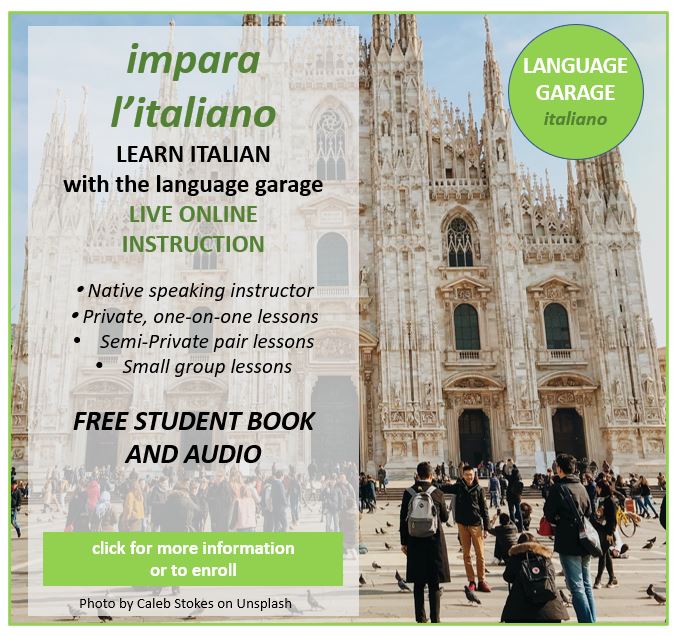Mastering Regular Italian -ERE Verbs
In this post we’re going to look at regular Italian –ERE verbs. As you probably know, Italian verbs can be difficult to master because there are so many different endings to remember across all of the tenses. And many common verbs are irregular, so they’re unpredictable. But regular verbs are predictable, because they follow a reliable pattern of endings.
Regular verbs in Italian are divided into three different types depending on the infinitive. –ARE verbs end in –ARE in the infinitive, like parlare (to speak) or cantare (to sing). –ERE verbs end in –ERE in the infinitive, for example scrivere (to write) and credere (to believe). Finally, –IRE verbs end in –IRE in the infinitive, for example finire (to finish) or capire (to understand). –ERE verbs account for about 15% of Italian verbs, and they include some very common and useful verbs.
First, we’re going to look at the conjugation of regular –ERE verbs, and we’ll see several examples. Then we’ll practice conjugating a few common verbs. After that we’ll see one minor slightly irregular pattern in –ERE verbs ending in –gliere. Next we’ll see some verbs that may seem like regular –ERE verbs, but are actually irregular. Finally, we’ll wrap it up with more practice, because with verbs, practice is essential.
Regular Italian -ERE Verbs: Conjugation
To conjugate a regular Italian –ERE verb, simply remove the –ere ending. This leaves you with the verb stem, to which you add different endings depending on the subject.
| subject | ending | scrivere (to write) | prendere (to take) |
| io | -o | scrivo | prendo |
| tu | -i | scrivi | prendi |
| lui/lei/Lei | -e | scrive | prende |
| noi | -iamo | scriviamo | prendiamo |
| voi | -ete | scrivete | prendete |
| loro/Loro | -ono | scrivono | prendono |
Some common regular –ERE verbs are: scrivere (to write), prendere (to take), apprendere (to learn), vedere (to see), correre (to run), credere (to believe), leggere (to read), vendere (to sell), ricevere (to receive), rispondere (to answer), scendere (to go down), spendere (to spend), vivere (to live), vincere (to win), mettere (to put/place), decidere (to decide), chiudere (to close), conoscere (to know, to be familiar with), ridere (to laugh), sorridere (to smile), ripetere (to repeat), perdere (to lose), accendere (to turn on), chiedere (to ask for), battere (to beat), descrivere (to describe), promettere (to promise), rendere (to give back).
Note
There are just a few things to keep in mind when you use Italian subject pronouns and regular -ere verbs:
- First, don’t forget that Italian pronouns are typically dropped. That is, you normally just say prendo instead of io prendo to say I take.
- Italian has a few ways of saying you. Tu is the familiar form, usually reserved for friends, family, people your age or younger, or children. It’s a singular form, so you only use it to speak to one person. Lei is the more polite equivalent, for example when you’re speaking to an older stranger or someone in a more formal setting. Lei verbs take the same endings as lui/lei forms. Voi is the familiar plural, equivalent to all of you, y’all, or you guys. Loro is the formal plural. But note that Loro is becoming quite rare in modern Italian, and voi is used instead in both informal and formal settings.
- Regular –ERE verbs are stressed on the stem in all forms but noi and voi. For example, préndo and préndi, but prendiámo and prendéte. (The accent is only used here to show the stressed syllable; don’t write it when you’re using these verbs.)
- Unlike –ARE verbs, –ERE verbs do not change their spelling to preserve the pronunciation of the final consonant of the stem. For example, leggere means to read, with a soft g. It retains the soft g in the forms leggi, legge, leggiamo, and leggete. But it has a hard g in leggo and leggono. Similarly, vincere means to win, with a soft ch. It retains this sound in the forms vinci, vince, vinciamo, and vincete. But it becomes a hard k sound in vinco and vincono.
Practice A
Give the full conjugation of each of the following regular –ERE verbs. Answers are below.
- leggere (to read)
- mettere (to put)
- vedere (to see)
- chiudere (to close)
Example Sentences with Regular Italian-ERE Verbs
Now let’s see some examples of common -ERE verbs in sentences. Remember that you can negate a verb in Italian simply by putting non (not) before the verb. Other negatives are non…più (no longer, not anymore), non…mai (never), and non…niente (nothing, not… anything).
- Metto le chiavi sul tavolo.
I put the keys on the table. - Leggo molti libri di fantascienza.
I read a lot of science fiction books. - Scrive una lettera ogni settimana.
She writes a letter every week. - Vendo il mio vecchio telefono online.
I’m selling my old phone online. - Ricevi molti messaggi?
Do you get many messages? - Non viviamo in una città tranquilla.
We don’t live in a quiet town. - Prendono il treno ogni mattina.
They take the train every morning. - Non vinciamo mai.
We never win. - Domani prendiamo un caffè insieme.
Tomorrow we’ll have a coffee together. - Vivete vicino al centro della città?
Do you live near the city center?
Slightly Irregular -ERE Verbs Ending in -gliere
There is one subgroup or –ere verbs that have a slightly irregular conjugation. These verbs all end in –gliere, and the irregularity is that the –gl– changes to –lg– in the io and loro forms.
| subject | ending | scegliere (to choose) | cogliere (to pick) |
| io | [lg]-o | scelgo | colgo |
| tu | -i | scegli | cogli |
| lui/lei/Lei | -e | sceglie | coglie |
| noi | -iamo | scegliamo | cogliamo |
| voi | -ete | scegliete | coglete |
| loro/Loro | [lg] -ono | scelgono | colgono |
Common verbs in this group are scegliere (to choose), cogliere (to pick), raccogliere (to gather, to collect), togliere (to remove, to take off), accogliere (to welcome, to receive [guests]), and sciogliere (to melt).
- Cogli i fiori? No, colgo le erbe.
Do you pick flowers? No, I pick herbs. - Scegli un libro.
You choose a book. - Accolgono molti ospiti dall’Inghilterra.
They welcome a lot of guests from England.
Practice B
Give the full conjugation of each of the following regular –ERE verbs. Answers are below.
- raccogliere (to collect)
- togliere (to take off)
Irregular Italian Verbs Ending in –ERE
Now let’s look at the most important –ERE verbs that are irregular and must be memorized. They are: essere (to be), avere (to have), bere (to drink), volere (to want), potere (can, to be able), dovere (must, to have to), and tenere (to hold).
| essere | avere | bere | volere | potere | dovere | tenere | |
| io | sono | ho | bevo | voglio | posso | devo | tengo |
| tu | sei | hai | bevi | vuoi | puoi | devi | tieni |
| lui/lei/Lei | è | ha | beve | vuole | può | deve | tiene |
| noi | siamo | abbiamo | beviamo | vogliamo | possiamo | dobbiamo | teniamo |
| voi | siete | avete | bevete | volete | potete | dovete | tenete |
| loro/Loro | sono | hanno | bevono | vogliono | possono | devono | tengono |
Practice C
Now let’s practice those irregular verbs. For each sentence, give the correct form of the verb in parentheses, and then translate the completed sentences.
- Io ____ felice di essere qui. (essere)
- Voi ____ pronti per partire? (essere)
- Noi ____ un gatto e un cane. (avere)
- Tu ____ il libro per il corso? (avere)
- Io ____ un caffè ogni mattina. (bere)
- Voi ____ acqua dopo l’allenamento? (bere)
- Loro ____ andare al cinema stasera. (volere)
- Tu ____ una fetta di torta? (volere)
- Io non ____ venire alla festa domani. (potere)
- Noi ____ uscire dopo pranzo. (potere)
- Tu ____ finire i compiti prima di giocare. (dovere)
- Io ____ telefonare a mia madre. (dovere)
- Lei ____ sempre il telefono in mano. (tenere)
- Noi ____ la porta aperta per i vicini. (tenere)
Practice D
Finally, let’s do the same thing with regular -ere verbs. For each sentence, give the correct form of the verb in parentheses, and then translate the completed sentences.
- Marta _____ molti libri. (leggere)
- Noi _____ una lettera ogni settimana. (scrivere)
- Tu _____ l’acqua minerale o naturale? (prendere)
- Carlo e Giulia _____ i loro amici ogni sera. (vedere)
- Io _____ sempre la verità. (credere)
- Voi _____ a casa dopo le lezioni? (correre)
- Maria _____ molto per la sua famiglia. (spendere)
- Loro _____ al professore per i compiti. (rispondere)
- Io _____ il giornale ogni mattina. (leggere)
- I ragazzi _____ i loro telefoni negli zaini. (mettere)
- Tu _____ sempre i tuoi amici al telefono. (chiedere)
- Davide _____ il vino per la cena. (scegliere)
- Noi _____ il concerto insieme domani. (vedere)
- _____ il numero di telefono. (ripetere)
- Voi _____ spesso nei parchi durante l’estate? (correre)
- Lei _____ di andare al cinema stasera. (decidere)
- Gli studenti _____ aiuto all’insegnante. (chiedere)
- Noi _____ sempre un bel regalo per il compleanno. (scegliere)
- Molti italiani _____ nelle città. (vivere)
- I bambini _____ i giochi nel soggiorno. (mettere)
Get on the road to speaking Italian with the Language Garage!
We hope you’ve enjoyed learning about regular Italian –ERE verbs, along with some irregular Italian –ERE verbs. If you’d like to learn more:
- Follow us on Facebook, LinkedIn, BlueSky, Twitter, Threads, Instagram, or Pinterest. We publish lots of Italian vocabulary, grammar, and culture notes, so it’s a great way to pick up some new vocabulary and practice.
- Check out our other posts on Italian language, culture, and more.
- Enroll in affordable, flexible, and personalized private online Italian lessons or sign up for a small group online Italian class.
Answers
A
- leggere: leggo, leggi, legge, leggiamo, leggete, leggono
- mettere: metto, metti, mette, mettiamo, mettete, mettono
- vedere: vedo, vedi, vede, vediamo, vedete, vedono
- chiudere: chiudo, chiudi, chiude, chiudiamo, chiudete, chiudono
B
- raccogliere: raccolgo, raccogli, raccoglie, raccogliamo, raccogliete, raccolgono.
- togliere: tolgo, togli, toglie, togliamo, togliete, tolgono.
C
- Io sono felice di essere qui.
- Voi siete pronti per partire?
- Noi abbiamo un gatto e un cane.
- Tu hai il libro per il corso?
- Io bevo un caffè ogni mattina.
- Voi bevete acqua dopo l’allenamento?
- Loro vogliono andare al cinema stasera.
- Tu vuoi una fetta di torta?
- Io non posso venire alla festa domani.
- Noi possiamo uscire dopo pranzo.
- Tu devi finire i compiti prima di giocare.
- Io devo telefonare a mia madre.
- Lei tiene sempre il telefono in mano.
- Noi teniamo la porta aperta per i vicini.
C (Translations)
- I am happy to be here.
- Are you ready to leave?
- We have a cat and a dog.
- Do you have the book for the course?
- I drink a coffee every morning.
- Do you drink water after the workout?
- They want to go to the movies tonight.
- Do you want a slice of cake?
- I cannot come to the party tomorrow.
- We can go out after lunch.
- You must finish your homework before playing.
- I have to call my mother.
- She always holds the phone in her hand.
- We keep the door open for the neighbors.
D
- Marta legge molti libri.
- Noi scriviamo una lettera ogni settimana.
- Tu prendi l’acqua minerale o naturale?
- Carlo e Giulia vedono i loro amici ogni sera.
- Io credo sempre la verità.
- Voi correte a casa dopo le lezioni?
- Maria spende molto per la sua famiglia.
- Loro rispondono al professore per i compiti.
- Io leggo il giornale ogni mattina.
- I ragazzi mettono i loro telefoni negli zaini.
- Tu chiedi sempre i tuoi amici al telefono.
- Davide sceglie il vino per la cena.
- Noi vediamo il concerto insieme domani.
- Ripete il numero di telefono.
- Voi correte spesso nei parchi durante l’estate?
- Lei decide di andare al cinema stasera.
- Gli studenti chiedono aiuto all’insegnante.
- Noi scegliamo sempre un bel regalo per il compleanno.
- Molti italiani vivono nelle città.
- I bambini mettono i giochi nel soggiorno.
D (Translations)
- Marta reads many books.
- We write a letter every week.
- Do you take mineral or still water?
- Carlo and Giulia see their friends every evening.
- I always believe the truth.
- Do you run home after lessons?
- Maria spends a lot on her family.
- They answer the professor about the homework.
- I read the newspaper every morning.
- The boys put their phones in the backpacks.
- You always ask for your friends on the phone.
- Davide chooses the wine for dinner.
- We will see the concert together tomorrow.
- He repeats/She repeats the phone number.
- Do you often run in parks during the summer?
- She decides to go to the cinema tonight.
- The students ask the teacher for help.
- We always choose a nice gift for the birthday.
- Many Italians live in cities.
- The children put the toys in the living room.
Photo by picjumbo.com on Pexels






